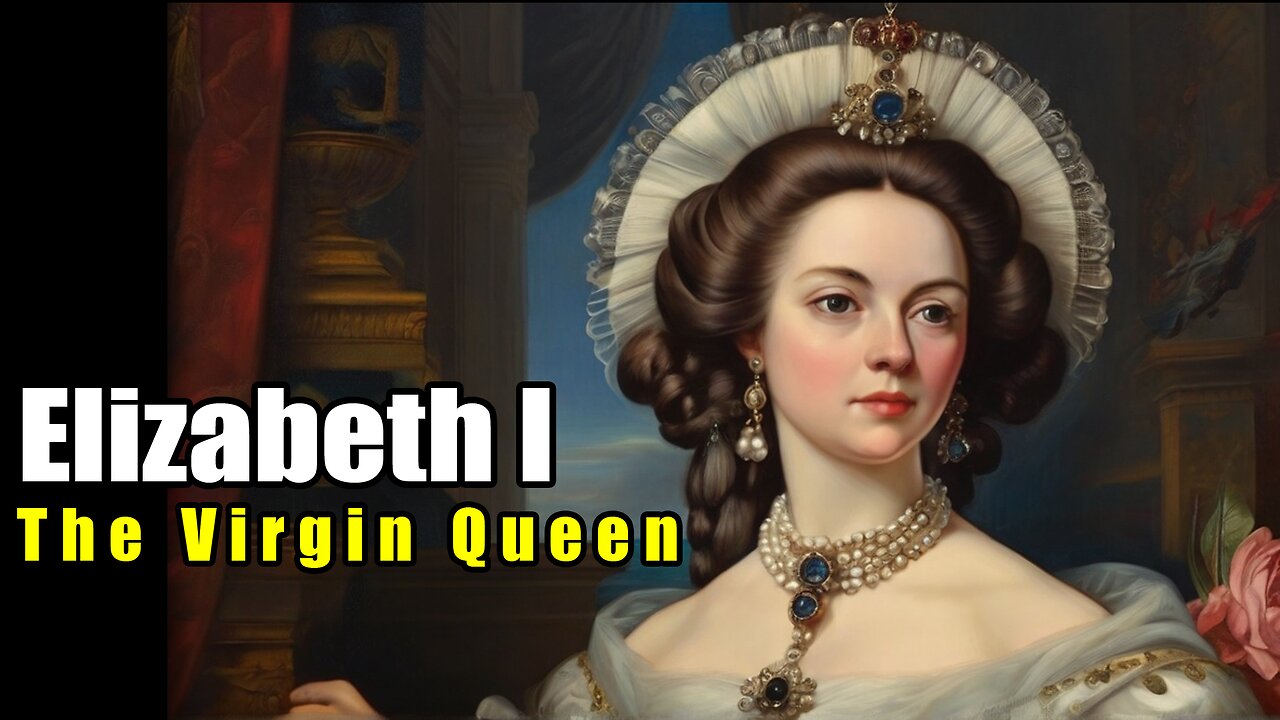Premium Only Content

Elizabeth I: The Virgin Queen (1533 - 1603)
Elizabeth I (1533-1603), known as the "Virgin Queen," was the daughter of King Henry VIII and Anne Boleyn. She became one of England's most iconic monarchs, reigning from 1558 until her death in 1603. Elizabeth's reign is often referred to as the Elizabethan Era, a period of cultural and economic flourishing in England. Here is an overview of Elizabeth I's life and her significant contributions as a ruler:
Early Life:
Birth and Early Years:
Elizabeth was born on September 7, 1533, at Greenwich Palace. Her mother, Anne Boleyn, was executed when Elizabeth was just two years old, and she was declared illegitimate.
Education and Tutelage:
Elizabeth received a solid education, studying languages, rhetoric, theology, and history. She was well-versed in classical literature and acquired diplomatic skills.
Accession to the Throne:
Death of Mary I:
Elizabeth's half-sister, Mary I, became queen after the death of their brother, Edward VI. Mary died childless in 1558, leading to Elizabeth's accession to the throne.
Elizabethan Era (1558-1603):
Elizabeth's reign is characterized by the flourishing of arts, literature, and exploration. It is often considered a golden age in English history.
Religious Settlement:
Religious Tolerance:
Elizabeth pursued a moderate religious policy, seeking to establish a religious settlement that would bring stability to England. The Elizabethan Religious Settlement aimed to find a middle ground between Catholicism and Protestantism.
Act of Supremacy (1559):
The Act of Supremacy established Elizabeth as the Supreme Governor of the Church of England, a title she preferred over "Supreme Head," avoiding gender-specific terms.
Foreign Policy:
Spanish Armada (1588):
Elizabeth's reign witnessed tensions with Catholic Spain. The Spanish Armada, a fleet sent by King Philip II of Spain in 1588 to invade England, was defeated, marking a significant victory for England.
Exploration and Colonization:
Elizabeth supported exploration, leading to notable expeditions such as those of Sir Walter Raleigh and Sir Francis Drake. These efforts laid the foundation for English colonization in the Americas.
Cultural Renaissance:
Literary and Artistic Flourishing:
The Elizabethan Era is renowned for its literary achievements, with William Shakespeare, Christopher Marlowe, and Edmund Spenser among its prominent figures. The era also witnessed the flourishing of music, poetry, and visual arts.
Theater and Performing Arts:
The construction of the Globe Theatre and the popularity of theatrical performances contributed to the growth of the English theater scene.
Marriage and Personal Life:
The Question of Marriage:
Elizabeth never married and remained the "Virgin Queen." Her reluctance to marry, often attributed to political considerations and concerns over preserving her autonomy, led to the Elizabethan Age being known as the Elizabethan "Virgin Queen."
Death and Legacy:
Death and Succession:
Elizabeth I died on March 24, 1603, at the age of 69. With her death, the Tudor dynasty came to an end. She was succeeded by James VI of Scotland, who became James I of England, uniting the crowns.
Enduring Legacy:
Elizabeth I is remembered as a skillful and politically astute ruler who navigated the challenges of her time. Her reign is celebrated for its cultural achievements, economic prosperity, and the establishment of a strong, Protestant England.
Cultural Icon:
Elizabeth I remains a cultural icon, often portrayed in literature, film, and art. Her legacy as the "Virgin Queen" and the symbol of the Elizabethan Era endures in popular imagination.
Elizabeth I's reign marked a pivotal period in English history, characterized by political stability, cultural brilliance, and a legacy that continues to shape the nation's identity.
-
 LIVE
LIVE
Due Dissidence
10 hours agoIsrael STRIKES IRAN, Iran HITS BACK, Marandi OWNS Media Hack, Is This THE END of MAGA?
1,976 watching -
 2:12:15
2:12:15
Nerdrotic
4 hours ago $3.71 earnedChris Cottrell Interpreting the Geomorphology of Carolina Bays | Forbidden Frontier #105
16.5K2 -
 LIVE
LIVE
Spartan
2 hours agoPro Halo Player | Halo Infinite Ranked Arena into SWTOR and/or Gears Beta
27 watching -
 LIVE
LIVE
This is the Ray Gaming
1 hour agoPushing for Rumble Creator Program
68 watching -
 LIVE
LIVE
Damysus Gaming
43 minutes agoDune: Awakening - Grinding for that Ornithopter - Guild Work! Drown in Some Spice!
27 watching -
 LIVE
LIVE
EricJohnPizzaArtist
4 days agoAwesome Sauce PIZZA ART LIVE Ep. #51: Music Night featuring Sophmore John!
141 watching -
 LIVE
LIVE
sophiesnazz
5 hours ago $2.86 earnedWE VIBING! !socials
162 watching -
 LIVE
LIVE
FoeDubb
9 hours ago🏰KINGDOM MENU: 👑HAPPY FATHERS DAY TO MY FELLOW RUMBLE DADS.👑THIS IS OUR DAY DILLY DILLY
49 watching -
 LIVE
LIVE
Illyes Jr Gaming
2 hours agoIt's Sunday! It's GAMEDAY!!! LET'S GO!
234 watching -
 23:14
23:14
DeVory Darkins
1 day agoDemocrats STUNNED by Political Attack as No Kings Portest Erupt
52.3K564